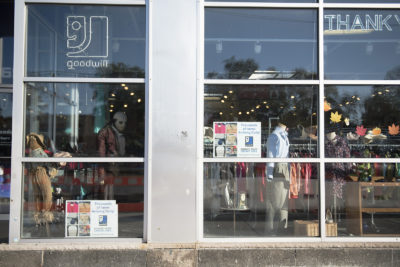
College students are tossing out secondhand stigmas associated with thrifting, and leading the move to make recycled clothing more appealing. These trendsetters — from public relations students to thrift and consignment shop owners — are campaigning to transform the way people perceive secondhand fashion.
Boston University marketing professor Shulamit Kahn said this emerging trend is sociological. Although people of various socioeconomic backgrounds have long been attracted to secondhand stores’ slashed prices, vintage and decades-old trends coming back in style is the catalyst for their recent surge in popularity.
The stigma of shopping at thrift stores has been dissipating not only because of their affordability, but also because of current fashion trends that dictate the market, many of which are reviving old styles, she explained.
“It’s a question of how fashion decides what’s chic … it’s chic to wear old-fashioned clothes … from the ‘80s or ‘90s,” she said. “What was holding people back before is that it wasn’t acceptable, but once it becomes acceptable, especially older-style clothes, then why not do it?”
In the same vein, Hilken Mancini, owner of the vintage boutique 40 South St., said she thinks a revitalized appreciation of past cultures has helped destigmatize secondhand fashion. But besides the nostalgia, many choose to shop used for environmental purposes as well.
“People are maybe more appreciative of not being wasteful and our environment, and they see the value in things that have already existed and they don’t just want to throw things away,” Mancini said.
Like Kahn, Marcini acknowledged the “stupidly expensive” cost of high fashion. College students, who are often on a tight budget, can buy secondhand, high-quality pieces for a fraction of the piece of clothing’s original price.
“Buying a piece that was made in the United States in the ‘70s was made as well as a high designer piece is now,” she said.
Mancini also said more people want to purchase clothing at these stores because of their uniqueness, being “anti-status quo.”
Back on campus, BU’s own PRLab, a student-run public relations agency, partnered with Goodwill to promote the store and spread its mission of serving the community, particularly for lower-income shoppers.
Their collaborative campaign aims to alleviate residual stigmas related to thrift store shopping, PRLab account executive Aiganym Ashimbayeva said.
One of the ways PRLab has addressed the stigma of thrifting is by targeting frugal college students through social media, the College of Communication senior added.
This year for Halloween, PRLab created a series of 30-second DIY costume videos showcasing Goodwill as a versatile shopping destination for Halloween, according to Goodwill’s spokesperson, James Harder.
With the closing of this year’s Halloween season, PRLab is now shifting gears to their “Giving Tuesday” campaign to promote a day of donations at Goodwill — the Tuesday after Black Friday — in which customers are encouraged to donate goods, clothing and even financial gifts to nonprofit organizations like Goodwill.
Harder said by shopping at secondhand stores, BU students can mix and match and come up with unique outfits at affordable prices. But at Goodwill in particular, customers are supporting a utilitarian, community-oriented mission.
“We’re not a big box retailer,” Harder said. “You’re helping the community because you’re supporting Goodwill, and you’re helping the environment because you’re keeping things out of the landfill.”
Many students who shop at the Goodwill on BU’s campus said they have encountered the stigma of purchasing secondhand clothing. Nonetheless, they enjoy the store because of its affordable prices and appreciate the nonprofit’s vision for the community.
Roberto Cordova, a freshman in the School of Education, said he shops at Goodwill because of its inexpensive prices and has been doing so for a while. Cordova said he thinks that students who shop at Goodwill are largely unaware of its mission and are mainly attracted to shop there because of the low pricing.
“I definitely think it’s more about affordability,” he said. “I’m sure some people are [aware] that Goodwill is actually doing good things like that, but I feel it definitely comes second to price.”
Shaina Horstmann, a COM freshman, said she thinks Goodwill does an effective job of reaching out to students and promoting the student discount for their secondhand offerings.
“Goodwill is overall seen as a good cheap option, but a lot of kids still prefer newer, trendier clothing and are willing to spend extra money at retail stores to get it,” Horstmann said.
Mallika Chandaria, a sophomore in the College of Fine Arts, said she had never gone to a store like Goodwill before coming to BU because of its stigma, but now she frequents the thrift store to buy clothes. However, Chandaria also said she thinks Goodwill could do a better job compensating its employees “based on the hours and demands of their jobs.”
“Although I think it’s great that they hire disadvantaged people and immigrants, I am critical of how little they are paid based on the hours and demands of their job,” she said. “I definitely think that they could do better.”
Noor Adatia and Alana Levene contributed to the reporting of this article.























































































































